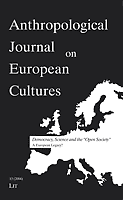Karl Popper in Srebrenica: On Justice and Truth after Genocide
Karl Popper in Srebrenica: On Justice and Truth after Genocide
Author(s): Richard A. WilsonSubject(s): Anthropology
Published by: LIT Verlag
Keywords: Justice; History; Yugoslavia
Summary/Abstract: This article examines Karl Popper’s critique of totalitarian justice in The Open Society and its Enemies. It explores Popper’s understanding of ‘liberal justice’ and examines the link between liberal justice and scientific approaches to truth. In Popper’s view, liberal justice requires a positivist conception of truth to function correctly. What are the consequences of Popper’s formulation of the relationship between justice and science? How, for instance, does it shape our understanding of the place of history and truth in the courtroom? The article applies Popper’s ideas on liberal justice and scientific method to the International Criminal Court for the former Yugoslavia [ICTY], which aims to determine guilt or innocence, establish accountability and furnish an adequate account of violence in Bosnia in the 1990s. It examines the case of General Krstic, originally accused of genocide in Srebrenica. The article concludes that in Popper’s vision of the unity of methods of social and physical sciences, there is little way of combining scientific information and historical interpretation in the way that we have seen the ICTY do in the case of General Krstic. For Popper, science and the creation of universal and generalizable lawsmust always prevail. Popper provides a convincing account of how democracy and therefore justice need science, and I have sought to complement this with a role for historical interpretation aswell. Historical interpretation is essential for liberal global justice institutions trying to make categories of justice meaningful and build the rule of law in places like Bosnia, SierraLeone and Cambodia. This requires new forms of legal reasoning which can demonstrate (scientifically) that criminal acts were committed and (historically) that these singular acts were associated with totalitarian political projects.
Journal: Anthropological Journal on European Cultures AJEC
- Issue Year: 2005
- Issue No: 13
- Page Range: 69-92
- Page Count: 24
- Language: English
- Content File-PDF

